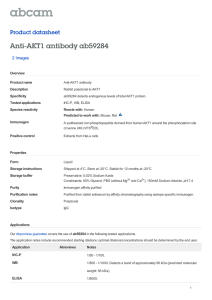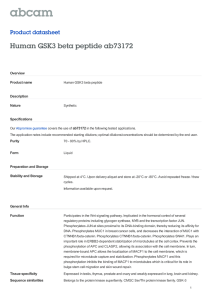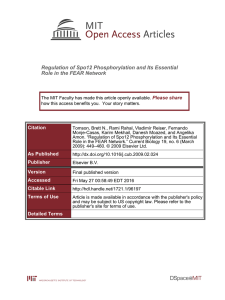Anti-Girdin antibody ab111035 Product datasheet 1 Image
advertisement
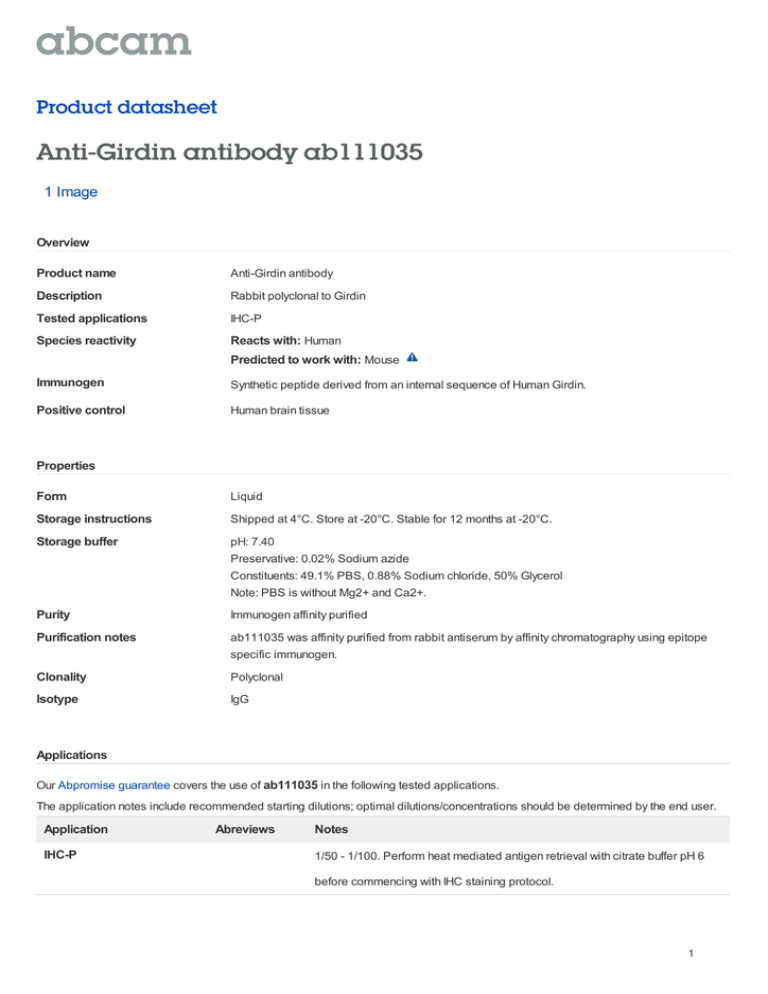
Product datasheet Anti-Girdin antibody ab111035 1 Image Overview Product name Anti-Girdin antibody Description Rabbit polyclonal to Girdin Tested applications IHC-P Species reactivity Reacts with: Human Predicted to work with: Mouse Immunogen Synthetic peptide derived from an internal sequence of Human Girdin. Positive control Human brain tissue Properties Form Liquid Storage instructions Shipped at 4°C. Store at -20°C. Stable for 12 months at -20°C. Storage buffer pH: 7.40 Preservative: 0.02% Sodium azide Constituents: 49.1% PBS, 0.88% Sodium chloride, 50% Glycerol Note: PBS is without Mg2+ and Ca2+. Purity Immunogen affinity purified Purification notes ab111035 was affinity purified from rabbit antiserum by affinity chromatography using epitope specific immunogen. Clonality Polyclonal Isotype IgG Applications Our Abpromise guarantee covers the use of ab111035 in the following tested applications. The application notes include recommended starting dilutions; optimal dilutions/concentrations should be determined by the end user. Application IHC-P Abreviews Notes 1/50 - 1/100. Perform heat mediated antigen retrieval with citrate buffer pH 6 before commencing with IHC staining protocol. 1 Target Function Plays a role as a key modulator of the AKT-mTOR signaling pathway controlling the tempo of the process of newborn neurons integration during adult neurogenesis, including correct neuron positioning, dendritic development and synapse formation. Enhances phosphoinositide 3-kinase (PI3K)-dependent phosphorylation and kinase activity of AKT1/PKB, but does not possess kinase activity itself. Phosphorylation of AKT1/PKB thereby induces the phosphorylation of downstream effectors GSK3 and FOXO1/FKHR, and regulates DNA replication and cell proliferation (By similarity). Essential for the integrity of the actin cytoskeleton and for cell migration. Required for formation of actin stress fibers and lamellipodia. May be involved in membrane sorting in the early endosome. Tissue specificity Expressed ubiquitously. Sequence similarities Belongs to the CCDC88 family. Post-translational modifications Phosphorylation is induced by epidermal growth factor (EGF) in a phosphoinositide 3-kinase (PI3K)-dependent manner. Phosphorylation by AKT1/PKB is necessary for the delocalization from the cell membrane and for cell migration. Cellular localization Membrane. Cell membrane. Cytoplasm > cytosol. Cytoplasmic vesicle. Cell projection > lamellipodium. Localizes to the cell membrane through interaction with phosphoinositides. Anti-Girdin antibody images ab111035, at a 1/50 dilution, staining Girdin in paraffin embedded Human brain tissue by Immunohistochemistry. Image on the right was from tissues treated with the synthetic peptide. Immunohistochemistry (Formalin/PFA-fixed paraffin-embedded sections) - Girdin antibody (ab111035) Please note: All products are "FOR RESEARCH USE ONLY AND ARE NOT INTENDED FOR DIAGNOSTIC OR THERAPEUTIC USE" Our Abpromise to you: Quality guaranteed and expert technical support Replacement or refund for products not performing as stated on the datasheet Valid for 12 months from date of delivery Response to your inquiry within 24 hours We provide support in Chinese, English, French, German, Japanese and Spanish Extensive multi-media technical resources to help you We investigate all quality concerns to ensure our products perform to the highest standards If the product does not perform as described on this datasheet, we will offer a refund or replacement. For full details of the Abpromise, please visit http://www.abcam.com/abpromise or contact our technical team. Terms and conditions Guarantee only valid for products bought direct from Abcam or one of our authorized distributors 2 3
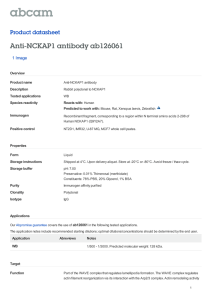
![Anti-Kv2.1 antibody [S89-34] ab105586 Product datasheet 3 Images Overview](http://s2.studylib.net/store/data/012699847_1-65b1107bc74aab8049a255bc1b967c6c-300x300.png)
